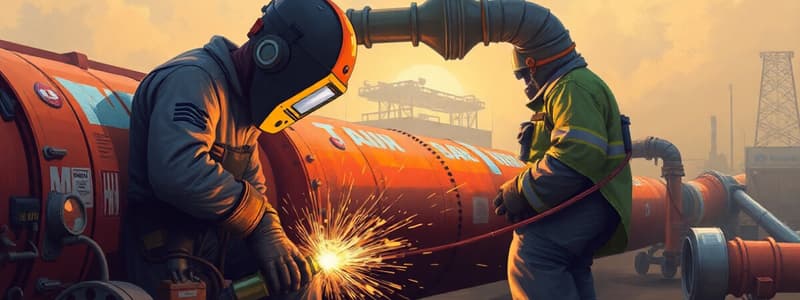Podcast
Questions and Answers
In the pipeline weld failure incident, what immediate action could have significantly improved the injured workers' initial treatment?
In the pipeline weld failure incident, what immediate action could have significantly improved the injured workers' initial treatment?
- Ensuring prompt notification to SA 911. (correct)
- Using only Rigger-I certified personnel for lifting operations.
- Implementing stricter SA standards for pipeline restraint.
- Conducting a more thorough risk assessment of the tie-in location.
What combination of factors most directly contributed to the failure of the tack welds during the pipeline tie-in?
What combination of factors most directly contributed to the failure of the tack welds during the pipeline tie-in?
- Unrecognized complexity of the tie-in location and delayed SA 911 notification.
- Lateral stress from lifting equipment and thermal contraction. (correct)
- Failure to use multi-crane lifts and lack of risk assessment.
- Inadequate contractor first aid and lack of a critical lift plan.
What specific work permit requirement was not followed, contributing to the pipeline incident?
What specific work permit requirement was not followed, contributing to the pipeline incident?
- Using appropriately sized cranes for the lift.
- Conducting a joint site inspection before issuing the permit. (correct)
- Ensuring all personnel were Rigger-I certified.
- Restraining the pipe during the tie-in process.
Besides lateral stress, what other mechanical action applied to the pipeline contributed to the tack weld failure?
Besides lateral stress, what other mechanical action applied to the pipeline contributed to the tack weld failure?
According to the 'What can be learned?' section, what specific guideline should be followed when performing tandem (multi-crane) lifts?
According to the 'What can be learned?' section, what specific guideline should be followed when performing tandem (multi-crane) lifts?
Flashcards
What caused the pipeline failure?
What caused the pipeline failure?
The temporary welds used to hold pipeline sections in place failed.
Why was the complexity missed?
Why was the complexity missed?
The location's complexity (pipe bends, elevation changes) wasn't recognized or properly assessed for risks.
Permit requirements missing?
Permit requirements missing?
Work permit requirements (including joint site inspection) were not followed when issuing the permit.
Restraint missing?
Restraint missing?
Signup and view all the flashcards
Work permit lifesaving rule
Work permit lifesaving rule
Signup and view all the flashcards
Study Notes
- Attempting to align two sections of a newly constructed 36" pipeline led to temporary welding (tack welds) failing.
- A pipe segment shifted sideways.
- The incident struck and injured three workers, resulting in one fatality.
What went wrong?
- Pipe bends and elevation changes were present at the tie-in location.
- The complexity of the location was not recognized or risk-assessed.
- Work permit requirements were not followed.
- This included issuing the permit from the office without a joint site inspection.
- The pipe was not restrained during the tie-in as required by Saudi Aramco standard.
- This lack of restraint allowed sudden movement.
- Lateral stress was applied to the pipeline via lifting equipment.
- Thermal contraction contributed to the tack weld failure.
- Delayed notification to SA 911 resulted in inadequate contractor first aid treatment for the injured workers.
What can be learned?
- Conduct risk assessments for complex pipeline tie-in activities.
- Perform tandem (multi-crane) lifts using Rigger-I and a critical lift plan as per GI 7.028.
- Restrain pipeline sections during tie-ins to prevent movement, as per SAES-W-012.
- Call 911 immediately for all notifiable incidents to ensure timely medical care.
Lifesaving Rule: Work Permit
- Conduct a joint site inspection to identify hazards at the job site and define required precautions.
Studying That Suits You
Use AI to generate personalized quizzes and flashcards to suit your learning preferences.

